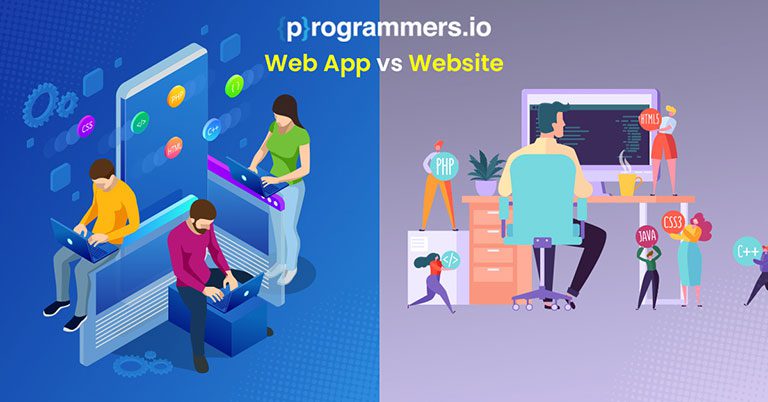Websites have become increasingly popular as we move further into an all-digital age. In fact, in 2022, over 71% of small businesses have a website. Simply put, without an online presence, it’s hard to survive in today’s world.
However, that doesn’t mean you have to have a website. You could also choose to build a web app. What’s the difference between a web app vs. website? Both options have their advantages and disadvantages, and it can be tough to decide which one is right for your business.
It’s likely that you’ll need to incorporate both into your businesses’ web development strategy. However, let’s take a closer look at the key differences between websites and web applications to help you make the best decision for your business and its needs.
What Is a Website?
A website is a set of web pages that are hosted together on the internet. All websites have a home page, which is the first page you see when you go to the website.
On the home page, you’ll likely see links to all the other pages on the website. When you click on one of those links, it takes you to another page on the website. How does that work?
Websites are made up of code, which is written in HTML, CSS, and Java. Typically, they also fall into one of two main categories: static and dynamic.
Static websites are those that have pre-written HTML code that does not change, even when new visitors come to the site.
Dynamic websites, on the other hand, are written in programming languages like PHP or ASP.NET. They can generate new content every time a visitor loads a page.
Once they’re built, you can host them on servers. These are computers that store all the files that make up a website.
So, when you or someone else types in your URL into a web browser like Google, it sends a request to the server that hosts the website. The server then sends back the files that make up the website, and your browser displays them as a webpage.
Note, however, that you can also access websites using apps on your phone or tablet. This is where most people start to get confused. If a website can be viewed on a smartphone, for example, does that make it a web app?
Not technically. However, most websites do contain web apps.
What Is a Web App?
A web app, or web application, is a type of online software that can be accessed from a web browser. Unlike mobile apps or desktop software, you don’t need to download and install a web app on your device; you can simply access it through a web link.
Typically, you can use a web application on different platforms. This includes Linux, Windows, and Mac, since they are all compatible with modern browsers.
Many of the modern web application interfaces are developed using languages such as HTML, CSS, and Java (yes, similar to websites), which are supported by most browsers.
Another key difference between a web app and a website is the fact that most web applications are dynamic and require server-side processing. In this context, they’re used to carry out specific functions that create features on your website such as:
- Online forms
- Shopping functions
- Videos and photos
- File conversion
Still confused? We don’t blame you. They’re honestly very similar! Let’s break down the similarities and differences even further for you.
Web App vs. Website: Similarities & Differences
When it comes to the internet, there are two different types of tools that people use in order to access information: websites and web apps.
While both websites and web apps provide users with a way to view online content, there are some key differences between the two. Here are some of the most notable similarities and differences between websites and web apps.
Similarities
To start with, both websites and web apps require an internet connection in order to be accessed. This is true because both are hosted on a server that requires internet access to, well, access. You can also access them both via a standard web browser.
Likewise, both websites and web apps can be built using different programming languages. This includes HTML, CSS, and JavaScript. You can also use both of these types of online spaces for a variety of purposes. This includes eCommerce, news, and even for entertainment.
When it comes down to it, each is a helpful online tool for hosting and promoting your businesses’ services, offerings, and more.
Differences
How are web apps different from websites? The biggest difference is that websites are generally designed to provide users with information while web apps are designed to provide specific functionality or service.
Additionally, it’s likely that, in order to access a web app, it might require you or another user to create an account or log in to a portal. This isn’t the case with websites. Websites can be accessed by anyone with an internet connection.
Website or Web Application: Which Is Better?
There are pros and cons to both of these online tools and the answer ultimately depends on the specific needs of your project.
Websites are typically simpler and easier to develop than web applications. They tend to be focused on providing information, rather than functionality. As a result, they are often less expensive and can be completed more quickly.
However, websites can be less interactive and user-friendly than web applications. Web applications tend to be more complex, but they can offer a more engaging and participatory experience for users.
This is also why they’re often more expensive to develop. Keep in mind that they can provide a higher return on investment over time, though.
When deciding whether to invest in a website or a web application, it is important to consider the specific needs of the project.
If time and cost are major concerns, then a website may be the best option. However, if interactivity and user experience are paramount, then a web application may be the better choice.
Hire an Expert Developer
When it comes to the web app vs. website debate one thing is for sure: if you want to build an online presence then you’ll need to have a team of qualified programmers by your side.
At Programmer.io, we can provide you with access to the right expert for your business needs and goals. Think of us as an extension of your team working tirelessly to help you accomplish your goals faster.
Click here to learn more about hiring us to help you build your web app or website.




